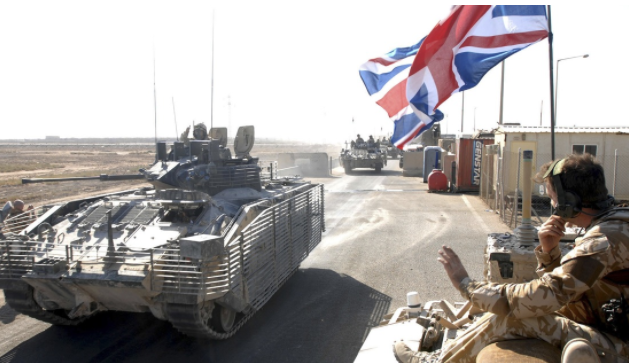An initial inquiry into the actions of UK forces in Iraq ended in 2006 without yielding an official investigation. However, last year, the Hague-based ICC reopened the inquiry, and in its 2014 Report on Preliminary Examination Activities said it was looking into a litany of abuses allegedly perpetrated by British forces in the aftermath of the 2003 US-led invasion of Iraq.
Those potential violations included accounts of burning, electrocution, mock executions, threats to detainee's families, sexual assault and "forced exposure to pornography." The report also cited the alleged killing of at least 8 Iraqis while in the custody of UK forces, as well as "8 civilians who were killed by UK personnel in other situations outside of custody."
This Thursday, the ICC released its 2015 report on preliminary examinations, which included reference to 259 "unlawful killings of civilians," 47 of whom were Iraqis who "reportedly died in UK custody."
Angela Stevens, a lawyer with the firm, said as awareness of the ICC inquiry increases, more Iraqis are emerging with both their own accounts of abuse, or those of their relatives, both living and allegedly killed by British forces.
"Even though these deaths in some cases occurred ten years ago, people are only now finding out now they can come forward and make complaints about it," Stevens said.
Since its latest submission to the court, the law firm has continued to receive new cases — more than 100 in all — which it expects to make known to the court at a later date. Stevens said the potential criminal cases range from deaths in custody to killings during home raids, to a wide range of abuse that did not result in deaths.
British citizens suspected of committing those crimes may be tried in the UK, which could make an ICC investigation unnecessary. The ICC can become involved only if it decides that the domestic justice system does not adequately investigate and prosecute responsible individuals.
Mark Kersten, a researcher at the University of Toronto's Munk School of Global Affairs, said the new figures could push the international court towards an official investigation. Such a step would potentially lead to the unprecedented issuance of arrest warrants for British citizens by the ICC, which so far has never conducted an official investigation focused on European or North American nations.
But first, court watchers will look for how the British government responds to the court's information.
"The real purpose of this preliminary examination is to galvanize the UK judiciary to look into and prosecute these crimes as war crimes and human rights violations," said Kersten. "The ideal scenario isn't actually to open an official investigation and start issuing arrest warrants, it's to get meaningful action within the UK's judiciary."
While neither the ICC nor Public Interest Lawyers have released a case-by-case breakdown of the compiled allegations, Thursday's report offers a window into what the court has in hand. According to the ICC, the report from Public Interest Lawyers "alleges 19 cases of rape in detention, including male anal rape, and 26 case of other forms of sexual violence."
The ICC said the allegations of sexual violence included, among other acts, "touch of genitalia, forced masturbation, forced or simulated sexual acts (including oral sex), and forced exposure to sexual acts by individual soldiers or between soldiers."
Both the report sent to the court in September and another delivered in January 2014 raise allegations of systematic abuse at UK-controlled facilities throughout Iraq between 2003 and 2008. The communications, wrote the ICC, "further submit that over two hundred cases of alleged unlawful killing in custody and in situations outside of custody in Iraq can be attributed to UK Services personnel." As of October, the court had received reports of a total of 1,268 cases of both alleged killings and incidents of ill-treatment.
"We don't want these stories to be forgotten," said Stevens. "We want them to be kept at the forefront. The reason we are bringing these cases is to get the truth of what happened and hold those responsible to account."
In its report, the office of ICC prosecutor Fatou Bensouda cautioned that it was "not examining at this stage the alleged criminal responsibility of any person named in the communications received."
Even without an official investigation, that the ICC' should be looking into British activities in Iraq is deeply embarrassing to the UK, which has been among the court's principal champions. But the review of allegations against British individuals also exposes the limits of the court's reach — principally that it is not in a position to prosecute American forces in Iraq, who made up the vast bulk of those deployed in the country between 2003 and 2008. Neither Iraq nor the United States is a party to the ICC's Rome Statute -- but the UK is, meaning the court can bring cases against British citizens regardless of where their alleged crimes took place.
However, the US did not escape mention in Thursday's report. The ICC is also examining alleged crimes in Afghanistan, and said it would review potential violations committed in Kunduz during fighting in September and October of this year. Amidst efforts to retake the city from Taliban fighters, an American gunship killed at least 22 people when it fired on a Doctors Without Borders hospital for roughly an hour.
The court also criticized the US for not investigating longstanding allegations of abuse committed by its forces in Afghanistan. The US government has told the UN's Committee against Torture that the Pentagon has carried out "thousands of investigations since 2001, and prosecuted or disciplined hundreds of service members for mistreatment of detainees and other misconduct."
According to the court, that is not enough. "Disciplinary measures recommended for commanders, it said, "did not go higher than the brigade commander level."
View the article


 RSS Feed
RSS Feed